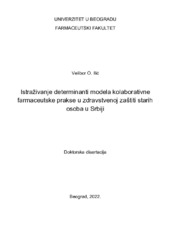Приказ основних података о документу
Istraživanje determinanti modela kolaborativne farmaceutske prakse u zdravstvenoj zaštiti starih osoba u Srbiji
Research of determinants of the collaborative pharmaceutical practice models in healthcare of the elderly in Serbia
| dc.contributor.advisor | Marinković, Valentina | |
| dc.contributor.other | Krajnović, Dušanka | |
| dc.contributor.other | Tadić, Ivana | |
| dc.contributor.other | Simin, Dragana | |
| dc.creator | Ilić, Velibor | |
| dc.date.accessioned | 2023-08-24T09:06:29Z | |
| dc.date.available | 2023-08-24T09:06:29Z | |
| dc.date.issued | 2022 | |
| dc.identifier.uri | https://eteze.bg.ac.rs/application/showtheses?thesesId=9145 | |
| dc.identifier.uri | https://fedorabg.bg.ac.rs/fedora/get/o:29869/bdef:Content/download | |
| dc.identifier.uri | https://plus.cobiss.net/cobiss/sr/sr/bib/84234761 | |
| dc.identifier.uri | https://nardus.mpn.gov.rs/handle/123456789/21489 | |
| dc.identifier.uri | https://farfar.pharmacy.bg.ac.rs/handle/123456789/4971 | |
| dc.description.abstract | U prvoj fazi istraživanja je obavljena kritička analiza publikovanih modela kolaborativnefarmaceutske prakse (KFP), kao i razvoj konceptualnog dinamičkog modela KFP u zdravstvenoj isocijalnoj zaštiti starije populacije. Desk analizom su pretraženi radovi iz elektronskih bazapodataka i dobijen je alat u obliku vodiča i ček-liste za donosioce odluka i regulativa za postizanjepreferiranih efekata prikupljenih kolaborativnih praksi, kroz označavanje modela i aktivnosti kojetreba preduzeti za implementaciju najprimenjivije kolaborativne zdravstvene i socijalne zaštitestarijih osoba. Pretraga je ponovljena u decembru 2021 godine i uočen je pad broja publikacija u2020. i 2021. godini, uzrokovan svetskom COVID-19 pandemijom. Sprovodena je i studija presekao stavovima starijih osoba (65+) prema interprofesionalnoj saradnji i KFP uz metodološkiutemeljen (Delfi metod) i razvijen upitnik, adekvatnih psihometrijskih karakteristika. Istraživanje jesprovedeno u gerontološkim centrima u Srbiji, a ispitanici su kao najveće probleme sa kojima sesuočavaju starije osobe u sistemu zdravstvene i socijalne zaštite naveli nedovoljnu vidljivost starijepopulacije i nedovoljnu informisanost. Na kraju, sprovedena je prospektivna sistemska analizarizika u procesima propisivanja, izdavanja i načinu primene lekova za korisnike gerontološkihdomova, radi identifikacije potencijalnih grešaka, kvantifikacije i rangiranja prioriteta pridruženihrizika, kao i definisanja korektivnih mera za smanjenje rizika za bezbednost pacijenata. Analizanačina i efekata otkaza (FMEA) pokazala je da su predložene korektivne mere postigle značajnounapređenje bezbednosti sistema u 36 od 38 slučaja potencijalnog otkaza sistema, uz smanjenjeukupne vrednosti kvantifikacije prioriteta rizika (RPN) za 45,08%. | sr |
| dc.description.abstract | In the first phase of the research, a critical analysis of published collaborative pharmaceuticalpractice (CPP) models was conducted, and conceptual dynamic model of CPP in health and socialcare of the elderly population was developed. Desk analysis was used to review the publicationsfrom electronic databases and provided a tool in the form of guides and checklists for decisionmakers and regulators to achieve the preferred effects of collected collaborative practices, throughmodels` identifications and activities which needed to be conducted in order to implement the mostapplicable collaborative health and social care for the elderly. The search was repeated in December2021 and a decrease in the number of publications in 2020 and 2021 was noticed, caused by theglobal COVID-19 pandemic. A cross-sectional study on the attitudes of older people (65+) towardsinterprofessional collaboration and CPP was conducted with a methodologically based (Delphimethod) and developed questionnaire, with good psychometric characteristics. The research wasconducted in nursing homes in Serbia, and the respondents mentioned the lack of visibility of theelderly population and insufficient information as the biggest problems faced by the elderly in thehealth and social care system. Finally, prospective systemic risk analysis was conducted in theprocesses of drug prescribing, dispensing and administering to nursing home users, in order toidentify potential errors, quantify and rank the priorities of associated risks, and define correctivemeasures to reduce risks to patient safety. Failure Mode and Effects Analysis (FMEA) showed thatthe proposed corrective measures achieved a significant improvement in system security in 36 outof 38 cases of potential system failure, with a reduction in the total value of RPN (Risk PriorityNumber) by 45.08%. | en |
| dc.format | application/pdf | |
| dc.language | sr | |
| dc.publisher | Универзитет у Београду, Фармацеутски факултет | sr |
| dc.rights | openAccess | en |
| dc.rights.uri | https://creativecommons.org/licenses/by-nc-nd/4.0/ | |
| dc.source | Универзитет у Београду | sr |
| dc.subject | interprofesionalna saradnja | sr |
| dc.subject | kolaborativna farmaceutska praksa | |
| dc.subject | starije osobe | |
| dc.subject | razvoj upitnika | |
| dc.subject | stavovi starijih osoba | |
| dc.subject | Delfi metod | |
| dc.subject | FMEA | |
| dc.subject | Interprofessional collaboration | |
| dc.subject | Collaborative pharmacy practice | |
| dc.subject | Older people | |
| dc.subject | Questionnaire development | |
| dc.subject | attitudes of the elderly | |
| dc.subject | Delphi method | |
| dc.title | Istraživanje determinanti modela kolaborativne farmaceutske prakse u zdravstvenoj zaštiti starih osoba u Srbiji | sr |
| dc.title.alternative | Research of determinants of the collaborative pharmaceutical practice models in healthcare of the elderly in Serbia | en |
| dc.type | doctoralThesis | en |
| dc.rights.license | BY-NC-ND | |
| dc.identifier.fulltext | http://farfar.pharmacy.bg.ac.rs/bitstream/id/13659/Disertacija_13592.pdf | |
| dc.identifier.fulltext | http://farfar.pharmacy.bg.ac.rs/bitstream/id/14538/Referat.pdf | |
| dc.identifier.rcub | https://hdl.handle.net/21.15107/rcub_nardus_21489 | |
| dc.type.version | publishedVersion |


